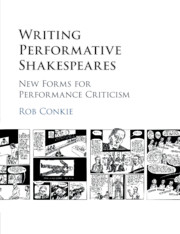5 - Engaging Shakespeare
Published online by Cambridge University Press: 05 March 2016
Summary
I conceived the title of this chapter before (consciously) encountering Bruce McConachie's Engaging Audiences. Especially coincidental is McConachie's opening sentence: ‘I decided to use “engaging” in the title of this book when I was performing a role in a Pittsburgh production of Richard II’: this chapter emerges from my having performed a role (or three) in a Perth (Australia) production of Henry IV, Part 1. This word, engage, and its derivatives, which McConachie unpacks via Shakespeare's histories, turns up frequently in discussions of (Shakespearean) theatre, particularly where those discussions focus on audiences. Inviting a mode of performative writing almost thirty years ago, Bert O. States, for example, warns that ‘the danger of a linguistic approach to theater is that it is apt to look past the site of our sensory engagement with its empirical objects’. More recently, Matthew Steggle, offering analysis of early modern applause, describes this period's drama as ‘a machine of communal, demonstrative, and participatory engagement with literature’. And Bridget Escolme, investigating the excessive emotions of the early modern theatre, both then and now, looks to uncover ‘the dramaturgy of the plays and the ways in which they were rhetorically structured to engage audiences’. Each of these quotations helps me to articulate the central concerns of this chapter, but the following two longer quotations are especially apposite. The first is from Anne Bogart's foreword to Erin Hurley's Theatre & Feeling, where she writes:
An actor noticing a beeper going off in the back of the theatre or responding to a fellow actor's sudden change in tempo, all the while maintaining the forward momentum of the play, engages the audience in this very balancing act [of intense concentration and awareness] on a moment-to-moment basis.
The second quotation, which echoes the first, is from Stephen Purcell's Shakespeare and Audience in Practice:
… when the Globe or an ‘immersive’ company make claims for a more engaged spectator, it is not an empty boast. The engagement may not be a primarily intellectual one, but involvement in a performance which leaves the heart racing and the adrenalin surging has very real effects on a spectator's moment-by-moment experience, including the process of making meaning.
The focus of this chapter is that this ‘process of making meaning’ is embedded – or, perhaps more accurately, embodied – within an affective engagement, what I am going to call cumulative performative affect.
- Type
- Chapter
- Information
- Writing Performative ShakespearesNew Forms for Performance Criticism, pp. 111 - 132Publisher: Cambridge University PressPrint publication year: 2016



